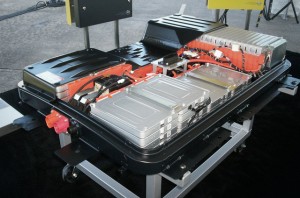Update from the Plugin Conference (7/27/10)
Nissan made it official. The LEAF will include an 8 year, 100,000 mile warranty.
This matches the Chevy Volt and warranty plans by automakers such as Ford. The following article summarizes issues leading to Nissan’s decision.
By John Addison (7/19/10)
Nissan appears to be debating between offering a 5 year / 60,000 mile warranty for the Nissan LEAF, or an 8 year /100,000 mile warranty that matches GM’s offer for the Chevy Volt. Because lithium batteries are expensive, warranty decisions can make the difference between an automaker making and losing money on early electric car sales.
The stakes are higher for Nissan than for GM or Toyota. For the Nissan LEAF to deliver up to 100 mile range per charge, a 24 kWh of lithium battery pack is included, and a larger charge-discharge range is required than for plug-in hybrids with 40 mile and less electric range. Warranty decisions are not only major financial considerations for auto makers; they must also second guess future EPA and California ARB ZEV regulations.
Battery life is a function of cycle life. After a couple of thousand cycles, the battery delivers less range. Battery life is also affected by how people drive, whether the battery is fast-charged in minutes or charged in hours, and climate. GM’s Chevy Volt includes a 16 kWh battery for a 40 mile range; the Toyota PHV includes a 5 kWh battery for a 14 mile range.
The more batteries used, the great is an automaker’s need for a financial warranty reserve and the more it costs them to replace a pack. GM and Toyota have not announced prices for the plug-in hybrids. The Nissan LEAF starts at $32,780. If a customer is worried about battery life, they can lease a LEAF for $349 per month.
The LEAF uses a 24 kWh lithium-nickel-manganese polymer battery made in its joint venture with NEC, state of charge many need to be 80% of the battery to provide the 100 mile range. The Toyota Prius PHV uses a 5.2 kWh Panasonic lithium-ion battery, probably using 68% of the battery. The Chevy Volt uses a 16kWh LG Chem Compact Power manganese spinel li-polymer prismatic, probably using 55% of the battery.
Nissan Survey
Over 100,000 have completed their on-line form with Nissan, expressing interest in buying or leasing. Over 12,000 have made a deposit. Because my wife and I have made our $99 deposit towards ordering a LEAF, we received a survey from Nissan. Here are a few of the survey questions and statements:
After five years, the batteries will provide about 80% of their original capacity. Acquiring a Nissan LEAF involves some steps you may not be familiar with, such as having your home’s electrical system inspected and having a home charging station installed prior to taking delivery of the vehicle. MSRP is $32,780. With federal tax savings of $7,500, net price is $25,280.
Standard powertrain warranties vary both by manufacturer and by vehicle model. For example, the standard powertrain warranty for the Honda Civic is 5 years / 60,000 miles. For the Toyota Prius, the hybrid components are covered for 8 years / 100,000 miles. And Chevy just announced the battery of the Chevy Volt will be covered for 8 years / 100,000 miles.
If Nissan announced the standard warranty for the Nissan LEAF battery was 5 years / 60,000 miles, to what degree would you seriously consider purchasing or leasing the Nissan LEAF as your next vehicle?
If Nissan announced the standard warranty for the Nissan LEAF battery was 8 years / 100,000 miles, to what degree would you seriously consider purchasing or leasing the Nissan LEAF as your next vehicle?
Assume Nissan announced the standard warranty for the Nissan LEAF battery was 5 years / 60,000 miles. In addition, assume that Nissan offered an extended service contract at additional cost that extended coverage to 8 years / 100,000 miles. Thinking about the Nissan LEAF battery warranty, payment options $250 to more than $2,500.
The rate of battery capacity loss for the Nissan LEAF can vary by individual. For instance, more aggressive acceleration and braking, or extreme hot temperatures over 120 degrees, could cause a more rapid loss of capacity over time. Conversely, smooth driving, or moderate climate, could result in less capacity loss.
Assume the Nissan LEAF capacity is 80% after 5 years, or 70% after 8 years, on average, but could be higher or lower depending on these factors.
Race to Market
Early adopters like us will tolerate warranties of less than 8 years; mainstream buyers may not. Early Tesla enthusiasts forked over $100,000 for Roadsters with 3 year, 36,000 mile warranties, or paid extra $12,000 for extended warranties. Over time, automakers will face dropping lithium battery costs and have years of actual battery life data, enabling them to offer better warranties. When I bought a Toyota Prius in 2002, Toyota only warrantied the NiMH battery for 3 years. I could not buy an extended warranty for the battery. Toyota would not even give me a replacement cost. I bought the Prius despite all this. After 130,000 miles the NiMH battery was fine. I could have replaced it for $2,500 if needed.
The race for early market leadership is on between dozens of makers including Toyota, Tesla, Nissan, Ford, and GM. Initial purchase price will be a big factor in market leadership. Features and range will also be important. Toyota took the early hybrid lead with the Prius and continuous to be the dominate leader despite recalling millions of vehicles.
It will be tough to price aggressively and offering a long-life warranty for the expensive battery vehicles. Stay tuned for complete price and warranty announcements from the auto makers.
Top 10 Electric Car Makers in the United States Market

